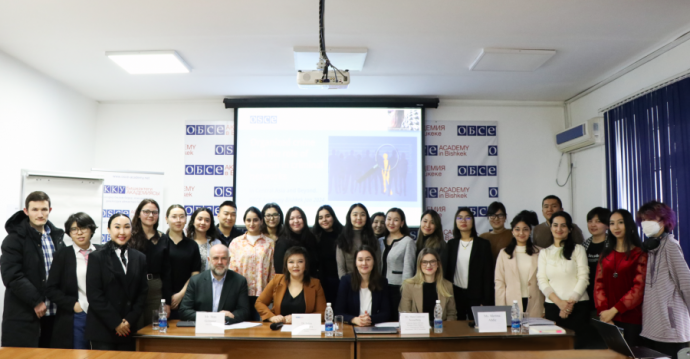News
Organized Crime and the Role of Women in Criminal Networks in Focus at OSCE Lecture
From 29 to 31 January 2024, 25 graduate students from Central Asia, Afghanistan and Mongolia participated in a training programme dedicated to organized crime and the often-overlooked role of women in criminal networks. The event was jointly organized by the OSCE Academy and OSCE Transnational Threats Department.
The participants identified and discussed key security challenges concerning organized crime across the region. The interactive discussions led to the development of concrete policy recommendations and ideas on how to effectively combat and prevent organized crime in the long term, notably the involvement of women in criminal networks across the Central Asian region and beyond.
“Organized crime poses a multifaceted security threat across Central Asia and beyond. It is imperative for students to understand its profound impact on security, economic development, environment and human rights,” said Dr. Indira Satarkulova, Acting Director of the OSCE Academy. “This interactive lecture not only taught students comprehensive methods to combat and prevent organized crime, but also placed special emphasis on preventing the recruitment of women and girls into criminal networks.”
Students used case studies with specific examples of organized crime and its emerging trends and challenges across the Central Asian region in light of the developments in Afghanistan. It further showcased effective methods to combat and prevent organized crime, including asset recovery, social re-use of confiscated assets and youth crime prevention from across the OSCE area.
During the course of the programme, students also discussed the main findings of the new OSCE study titled "Understanding the role of women in organized crime", assessing the recruitment, roles and reasons behind women's involvement in criminal networks in Central Asia and learning from international good practices on gender-sensitive organized crime prevention.
The event gathered 25 graduate students from Afghanistan, Kazakhstan, Kyrgyzstan, Mongolia, Tajikistan and Uzbekistan, enrolled in the OSCE Academy Masters Programmes in Human Rights and Sustainability, Economic Governance and Development and Politics and Security.



 Русская версия
Русская версия